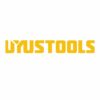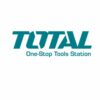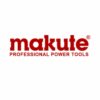Oil Filter
WhatsApp Order
An Oil Filter is a critical component used in engines, hydraulic systems, and machinery to remove contaminants from lubricating oil, transmission oil, engine oil, or hydraulic fluid. It ensures clean oil circulates through the system, protecting internal components from wear and maintaining efficient performance. Oil filters are commonly found in vehicles, generators, industrial equipment, and agricultural machinery. By trapping dirt, metal particles, and sludge, the oil filter prolongs engine life and reduces maintenance needs.
Description
Uses
- Engine Protection
o Filters engine oil in cars, trucks, motorcycles, and heavy-duty machinery to prevent internal damage.
o Keeps oil clean for optimal lubrication and cooling. - Hydraulic System Maintenance
o Removes contaminants in hydraulic oils used in forklifts, cranes, and other heavy equipment.
o Preserves hydraulic pump and valve performance. - Generator Maintenance
o Used in diesel and gasoline-powered generators to ensure uninterrupted, clean lubrication.
o Reduces risk of engine failure during continuous operation. - Industrial Equipment Lubrication
o Filters circulating oil in compressors, gearboxes, and industrial machines.
o Ensures long-term reliability of critical machinery. - Agricultural Equipment Efficiency
o Maintains oil cleanliness in tractors, harvesters, and other farm equipment.
o Minimizes downtime and mechanical breakdowns. - Transmission System Filtering
o Filters transmission fluid in automatic and manual systems.
o Improves shifting performance and transmission lifespan. - Oil Refinement in Processing Units
o In some setups, filters process oils before recirculation or reuse.
o Enhances oil recycling efficiency. - Marine and Aviation Engines
o Ensures clean lubrication in high-demand environments.
o Maintains reliability in critical operations. - Heavy-Duty Off-Road Equipment
o Ensures system cleanliness in excavators, loaders, and mining vehicles.
o Reduces maintenance costs and operational hazards.
SAFETY HANDLING PRECAUTIONS
Safety Precautions
- Wear Protective Gear
o Use gloves to prevent skin contact with hot or dirty oil.
o Wear safety glasses to protect eyes from splashes during removal or installation. - Depressurize System Before Servicing
o Shut off engine or machinery and allow oil pressure to drop before removing the filter.
o Avoid hot surfaces to prevent burns. - Use Correct Filter Type
o Ensure compatibility with specific machinery or engine model.
o Using the wrong filter can lead to leaks or failure. - Inspect Old Filter
o Check removed filter for metal debris or sludge that may indicate internal wear.
o Properly dispose of used oil and filters in accordance with environmental regulations. - Ensure Tight Installation
o Lubricate new filter gasket before installation.
o Hand-tighten and avoid over-tightening to prevent seal damage. - Check for Leaks Post-Installation
o Run the engine briefly and inspect for oil leaks around the filter seal.
o Re-tighten or replace if necessary. - Avoid Oil Spills
o Use oil pans and absorbents when removing old filters.
o Clean spills immediately to prevent slips. - Routine Maintenance
o Replace filters at recommended intervals to prevent clogging and oil starvation.
o Keep maintenance records for equipment performance tracking. - Environmental Handling
o Store used filters in sealed containers.
o Recycle according to local hazardous waste disposal guidelines.
Related products
Ball Point Hex Wrench Set – Medium
A Ball Point Hex Wrench Set - Medium size typically refers to a collection of nine hexagonal (hex) wrenches designed with ballpoint ends. The term "medium" may refer to the size or thickness of the wrenches, indicating that they are neither too small nor too large. The ballpoint end allows for a more flexible angle of approach when using the wrench, making it easier to engage with hexagonal screws or bolts at various angles. This set is likely to include different sizes to accommodate a range of applications, providing versatility for tasks that require hexagonal tools of medium dimensions.
Combination Feeler Gauge Set
A Combination Feeler Gauge Set is a precision measurement tool consisting of 32 individual metal blades or leaves, each of varying thickness. These blades are typically arranged in a compact set and are used to measure the clearance or gap between two objects. The set is designed to provide a range of thickness options, allowing users to select the appropriate blade for accurate measurements in applications such as engine valve clearances, spark plug gaps, and other tight tolerances. The combination aspect implies that the set includes a diverse range of thicknesses, offering versatility for various measurement needs. This tool is commonly utilized in automotive, engineering, and mechanical applications where precise measurements are crucial for proper functioning and performance.
Curved Jaws Locking Pliers – TPR Handle
Curved jaws locking pliers with TPR (Thermoplastic Rubber) handles are a type of versatile hand tool designed for gripping, clamping, and holding objects securely. The curved jaws provide a better grip on rounded or irregularly shaped surfaces, while the TPR handles offer ergonomic comfort and a non-slip grip.
These pliers typically feature a locking mechanism that allows users to adjust and maintain the clamping force, enabling them to securely hold objects of various sizes. The combination of curved jaws and TPR handles enhances the tool's usability and efficiency, making it suitable for a wide range of applications in mechanics, construction, and other industries where a reliable gripping tool is essential.
Fast Charger
PRODUCT DESCRIPTION
A fast charger is a device designed to quickly recharge compatible batteries with a voltage rating of 20 volts. The "fast" designation implies that the charger is engineered to deliver a higher charging current, allowing for a more rapid replenishment of the battery's energy capacity compared to standard chargers. This type of charger is commonly used for power tools, electronic devices, or other equipment that operates on 20V batteries, providing users with a more efficient and time-saving charging solution.
Hydraulic Bottle Jack
PRODUCT DESCRIPTION
A hydraulic bottle jack is a mechanical device designed for lifting heavy loads by applying force through the use of hydraulic fluid. It typically consists of a vertical cylinder, within which a piston is situated. When force is applied to the piston, it displaces hydraulic fluid, creating pressure and causing the cylinder to lift, thereby raising the load. These jacks are commonly used in automotive and industrial applications for tasks such as lifting vehicles or supporting heavy machinery during maintenance or repairs. The compact design of a hydraulic bottle jack, resembling a bottle in shape, allows for ease of use in confined spaces.
Torque Multiplier
A torque multiplier is a mechanical device designed to increase the torque applied to a fastener, such as a nut or bolt, by multiplying the force exerted on it. It typically consists of a gearbox with gears or other mechanisms that allow the user to apply a relatively small force while generating a much larger torque output at the tool end. This tool is commonly used in situations where high levels of torque are required for tightening or loosening large and tightly secured fasteners, such as those found in heavy machinery or industrial applications.
Tyre Inflating Gun
A tire inflating gun, often referred to as a tire inflator or air gun, is a pneumatic tool designed for inflating vehicle tires with compressed air. It typically consists of a trigger-operated nozzle connected to an air hose and is commonly used in automotive maintenance, such as at gas stations, auto repair shops, or by individuals for inflating tires at home. The gun allows precise control over the airflow and pressure, enabling users to inflate tires to the recommended levels specified by the vehicle manufacturer.
Universal Socket Wrench
A universal socket wrench, also known as a universal socket or universal joint socket, is a versatile hand tool designed for turning various types of fasteners, such as nuts and bolts. Its distinctive feature is the presence of a universal joint mechanism, allowing the socket to articulate and flex at different angles. This flexibility enables the wrench to access fasteners in tight or awkward spaces where a regular socket wrench might be challenging to use. Universal socket wrenches typically have a square drive on one end for attaching different-sized sockets, providing adaptability to a range of fastener sizes and types.


 Acrylic Sealants
Acrylic Sealants Construction Adhesives
Construction Adhesives Double-Sided Tape
Double-Sided Tape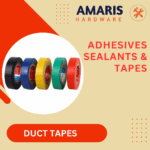 Duct Tape
Duct Tape Electrical Tape
Electrical Tape Epoxy & Resins
Epoxy & Resins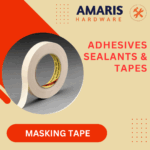 Masking Tape
Masking Tape
 Automotive Wrenches & Socket Sets
Automotive Wrenches & Socket Sets Battery Chargers & Jump Starters
Battery Chargers & Jump Starters Car Jacks & Stands
Car Jacks & Stands Car Wash & Detailing Products
Car Wash & Detailing Products Diagnostic Tools
Diagnostic Tools Tire Inflators
Tire Inflators Vehicle Lighting
Vehicle Lighting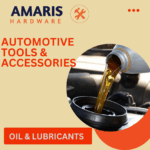 Oil & Lubricants
Oil & Lubricants
 Adhesives & Sealants
Adhesives & Sealants Bricks & Blocks
Bricks & Blocks Cement & Concrete
Cement & Concrete Drywall & Plaster
Drywall & Plaster Flooring (Tiles, Wood, Laminate)
Flooring (Tiles, Wood, Laminate) Lumber & Plywood
Lumber & Plywood Paints, Primers & Coatings
Paints, Primers & Coatings Insulation Materials
Insulation Materials Roofing Materials
Roofing Materials
 Circuit Breakers
Circuit Breakers Electrical Cables & Wires
Electrical Cables & Wires Switches & Sockets
Switches & Sockets Fuses & Relays
Fuses & Relays Connectors & Terminals
Connectors & Terminals Electrical Boxes & Panels
Electrical Boxes & Panels Conduit & Fittings
Conduit & Fittings Lighting Fixtures & Bulbs
Lighting Fixtures & Bulbs Extension Cords & Power Strips
Extension Cords & Power Strips
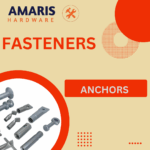 Anchors
Anchors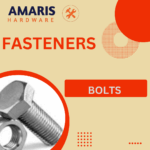 Bolts
Bolts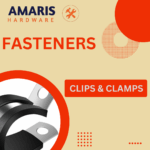 Clips & Clamps
Clips & Clamps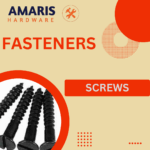 Screws
Screws Nuts
Nuts Washers
Washers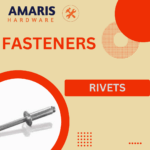 Rivets
Rivets Nails
Nails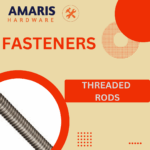 Threaded Rods
Threaded Rods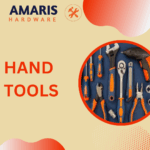
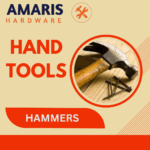 Hammers
Hammers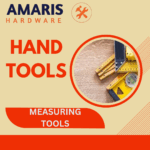 Measuring Tools (Tapes, Levels, Calipers)
Measuring Tools (Tapes, Levels, Calipers)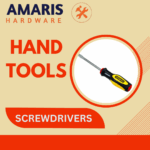 Screwdrivers
Screwdrivers Pliers & Cutters
Pliers & Cutters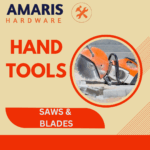 Saws & Blades
Saws & Blades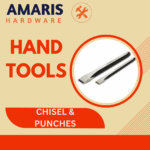 Chisels & Punches
Chisels & Punches Allen Keys & Hex Keys
Allen Keys & Hex Keys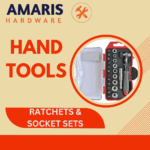 Ratchets & Socket Sets
Ratchets & Socket Sets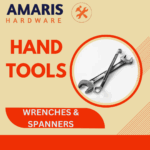 Wrenches & Spanners
Wrenches & Spanners
 Power Tool Accessories (Blades, Bits, Discs)
Power Tool Accessories (Blades, Bits, Discs)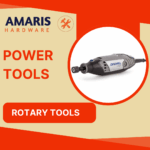 Rotary Tools
Rotary Tools Saws (Circular, Jigsaw, Reciprocating)
Saws (Circular, Jigsaw, Reciprocating)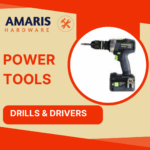 Drills & Drivers
Drills & Drivers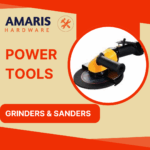 Grinders & Sanders
Grinders & Sanders Heat Guns
Heat Guns Nail Guns
Nail Guns Impact Wrenches
Impact Wrenches Batteries & Chargers
Batteries & Chargers
 Pipes & Fittings (PVC, Copper, PEX)
Pipes & Fittings (PVC, Copper, PEX) Plumbing Tools
Plumbing Tools Pumps & Motors
Pumps & Motors Sealants & Adhesives for Plumbing
Sealants & Adhesives for Plumbing Valves & Taps
Valves & Taps Water Heaters
Water Heaters Drainage Systems
Drainage Systems Faucets & Fixtures
Faucets & Fixtures Hoses & Tubing
Hoses & Tubing
 Hinges & Latches
Hinges & Latches Hooks & Brackets
Hooks & Brackets Window Hardware
Window Hardware Chains & Cables
Chains & Cables Casters & Wheels
Casters & Wheels Shelving & Storage Systems
Shelving & Storage Systems Door Handles & Locks
Door Handles & Locks Drawer Slides & Cabinet Hardware
Drawer Slides & Cabinet Hardware
 Personal Protective Equipment (PPE)
Personal Protective Equipment (PPE) Respirators & Masks
Respirators & Masks Safety Glasses
Safety Glasses Safes
Safes Security Cameras
Security Cameras Gloves
Gloves Helmets
Helmets Ear Protection
Ear Protection Fire Safety Equipment
Fire Safety Equipment Locks & Padlocks
Locks & Padlocks Motion Sensors & Alarms
Motion Sensors & Alarms
 Garden Fencing
Garden Fencing Garden Furniture Hardware
Garden Furniture Hardware Lawn Mowers
Lawn Mowers Trimmers & Edgers
Trimmers & Edgers Shovels & Spades
Shovels & Spades Rakes & Hoes
Rakes & Hoes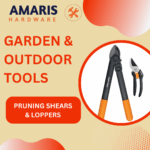 Pruning Shears & Loppers
Pruning Shears & Loppers Watering Systems (Hoses, Sprinklers, Nozzles)
Watering Systems (Hoses, Sprinklers, Nozzles)
 Interior Paints
Interior Paints Paint Brushes & Rollers
Paint Brushes & Rollers Paint Strippers & Thinners
Paint Strippers & Thinners Paint Trays & Accessories
Paint Trays & Accessories Exterior Paints
Exterior Paints Spray Paints
Spray Paints Primers & Undercoats
Primers & Undercoats Varnishes & Stains
Varnishes & Stains
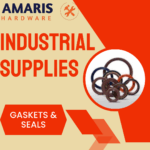 Gaskets & Seals
Gaskets & Seals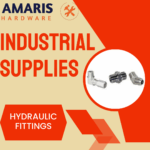 Hydraulic Fittings
Hydraulic Fittings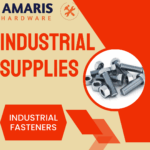 Industrial Fasteners
Industrial Fasteners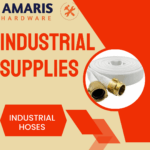 Industrial Hoses
Industrial Hoses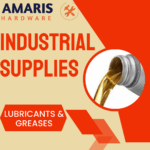 Lubricants & Greases
Lubricants & Greases Metal Sheets & Bars
Metal Sheets & Bars Bearings & Bushings
Bearings & Bushings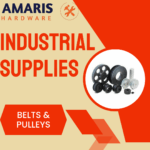 Belts & Pulleys
Belts & Pulleys
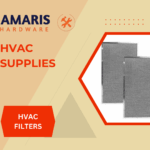 HVAC Filters
HVAC Filters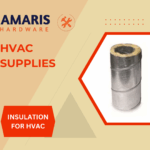 Insulation for HVAC
Insulation for HVAC Air Conditioners
Air Conditioners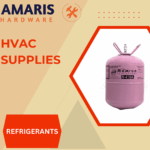 Refrigerants
Refrigerants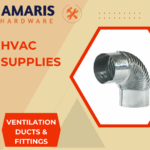 Ventilation Ducts & Fittings
Ventilation Ducts & Fittings Thermostats & Controllers
Thermostats & Controllers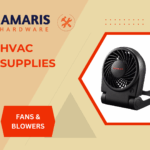 Fans & Blowers
Fans & Blowers
 Pegboards & Hooks
Pegboards & Hooks Shelving Units
Shelving Units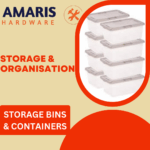 Storage Bins & Containers
Storage Bins & Containers Toolboxes & Tool Chests
Toolboxes & Tool Chests Workbenches
Workbenches Drawer Organizers
Drawer Organizers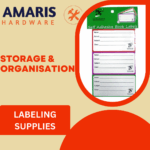 Labeling Supplies
Labeling Supplies
 Welding Accessories (Clamps, Brushes)
Welding Accessories (Clamps, Brushes) Welding Electrodes & Rods
Welding Electrodes & Rods Welding Helmets & Gloves
Welding Helmets & Gloves Welding Machines
Welding Machines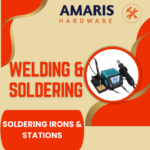 Soldering Irons & Stations
Soldering Irons & Stations Flux & Solder Wire
Flux & Solder Wire
 Generator Accessories
Generator Accessories Inverters
Inverters Portable Generators
Portable Generators Power Inverters
Power Inverters Transfer Switches
Transfer Switches Diesel & Gasoline Generators
Diesel & Gasoline Generators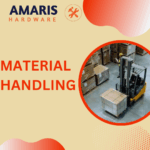
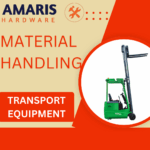 Transport Equipment: Carts, Dollies, and Hand Trucks
Transport Equipment: Carts, Dollies, and Hand Trucks Storage Solutions: Pallets, Racks, and Containers
Storage Solutions: Pallets, Racks, and Containers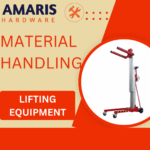 Lifting Equipment: Hoists, Cranes, and Jacks
Lifting Equipment: Hoists, Cranes, and Jacks Conveyors and Accessories: Belts and Rollers
Conveyors and Accessories: Belts and Rollers

